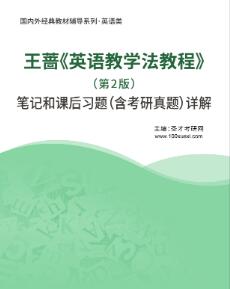本网课视频提供免费试看:/Ebook/999106.html
(点击开通年卡VIP会员,数万种资料免费使用)

课程简介
《英语教学法教程》(第2版)(王蔷主编)为普通高等教育“十五”国家级规划教材,适用于师范院校英语专业学生,也可用于中学英语教师的继续教育课程和各类英语教师的在职培训课程。该书被很多院校指定为英语专业考研必读书和学术研究参考书。作为该教材的学习辅导书,本书具有以下几个方面的特点:
1.梳理章节脉络,浓缩内容精华。每章的复习笔记以该教材为主并结合其他教材对本章的重难点知识进行了整理,并参考了国内名校名师讲授该教材的课堂笔记。
2.中英双语对照,凸显难点要点。本书章节笔记采用了中英文对照的形式,强化对重要难点知识的理解和运用。
3.解析课后习题,提供详尽答案。本书收录了教材中没有提供答案的习题,并进行详细解答。对于没有收录的习题,请参考教材。
4.精选考研真题,补充难点习题。本书精选名校近年考研真题及相关习题,并提供答案和详解。所选真题和习题基本体现了各个章节的考点和难点,但又不完全局限于教材内容,是对教材内容极好地补充。
本书提供电子书及纸质书,方便对照复习。
课程目录
1章 语言和语言学习
1.1 复习笔记
1.2 课后习题详解
1.3 考研真题与典型题详解
第2章 交际教学原则与任务型语言教学
2.1 复习笔记
2.2 课后习题详解
2.3 考研真题与典型题详解
第3章 国家英语课程标准
3.1复习笔记
3.2 课后习题详解
3.3 考研真题与典型题详解
第4章 教案设计与书写
4.1 复习笔记
4.2 课后习题详解
4.3 考研真题与典型题详解
第5章 外语课堂管理
5.1 复习笔记
5.2 课后习题详解
5.3 考研真题与典型题详解
第6章 语音教学
6.1 复习笔记
6.2 课后习题详解
6.3 考研真题与典型题详解
第7章 语法教学
7.1 复习笔记
7.2 课后习题详解
7.3 考研真题与典型题详解
第8章 词汇教学
8.1 复习笔记
8.2 课后习题详解
8.3 考研真题与典型题详解
【试读部分内容】
1章 语言和语言学习
1.1 复习笔记
本章要点:
1 The way we learn languages
我们习得语言的方式
2 Views on language
语言观点
3 The structural view of language
结构主义语言理论
4 The functional view of language
功能主义语言理论
5 The interactional view of language
交互语言理论
6 Common views on language learning
关于语言学习的普遍观点
7 Process-oriented theories and condition-oriented theories
强调过程的语言学习理论和强调条件的语言学习理论
8 The behaviorist theory
行为主义学习理论
9 Cognitive theory
认知学习理论
10 Constructivist theory
建构主义学习理论
11 Socio-constructivist theory
社会建构主义理论
12 Qualities of a good language teacher
一个好的语言老师必备的素养
13 Teacher’s professional development
教师专业技能发展
本章考点:
我们如何习得语言;结构主义语言理论;功能主义语言理论;交互语言理论;关于语言学习的普遍观点;强调过程的语言学习理论和强调条件的语言学习理论;行为主义学习理论;认知学习理论;建构主义学习理论;社会建构主义理论;成为一个好的语言老师所要具备的基本素质;教师专业技能发展图。
本章内容索引:
Ⅰ. The way we learn languages
Ⅱ. Views on language
1 The structural view of language
2 The functional view of language
3 The interactional view of language
Ⅲ.Views on language learning and learning in general
1 Research on language learning
2 Common views on language learning and learning in general
(1) Behaviorist theory
(2) Cognitive theory
(3) Constructivist theory
(4) Socio-constructivist theory
Ⅳ. Qualities of a good language teacher
Ⅴ. Development of a good language teacher
Ⅵ. An overview of the book
This chapter contains the foundation of this methodology course, discussing issues covering the definition of language and the language learning theories, as well as the impact of these theories on teachers’ teaching methods as well as learners’ learning ways. Moreover, this chapter discusses the qualities that a good English teacher should possess to help language teaching participants establish the proper teaching awareness.
这一章介绍的是教学法的基本方法论,探讨的问题涵盖语言的定义和语言学习的观点,以及这些观点对教师教学方式和学习者学习方式的影响。另外,本章还探讨了一个好的英语教师应具备的素质,以帮助语言教学参与者树立应有的教学意识。
Ⅰ. The way we learn languages(我们习得语言的方式)
Many human behaviors will show the influence of personal past experience, including learning foreign languages. The language learning mode that the language teachers accepted will affect their later teaching methods in the class.
The difficulty of language teaching is to enable learners with many differences to successfully acquire the new language.
许多人类行为会显现出个人过往经验的影响力,学习外语也是如此。语言老师接受过的语言学习模式会影响他们之后在课堂上的教学方式。
语言教学的难点在于尽量使存在许多不同之处的学习者成功习得新语言。
Ⅱ. Views on language(语言理论)
【考点:结构主义语言理论、功能主义语言理论、交互语言理论的定义及具体应用】
Three views about the nature of language: There are many possible theoretical positions about the nature of language. Here are three different views which are explicitly or implicitly reflected in current approaches to language learning.
关于语言本质的三种观点:在语言的本质上有很多潜在的语言观点,当前语言学习的方法直接或间接反映了三种不同观点。
1 The structural view of language(结构主义语言理论)
The structural view of language is that language is a system of structurally related elements for the transmission of meaning.
结构主义语言理论认为语言是一个用于传递意义的系统,其中各因素在结构上相互联系。
相关资料推荐:
王蔷《英语教学法教程》(第2版)精讲班
